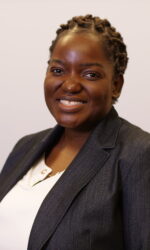2023 Perspectives from Black Husky Nurses
In honor of Black History Month and the contributions of Black nurses in our community we asked a few of our Black alumni, students, and faculty for their advice for future Black nurses. Specifically, we asked them to speak about the critical role nurses of color play in promoting health equity from their perspective. Here are a few of the responses:

Kaboni Gondwe
Kaboni Whitney Gondwe, PhD, RN, Professor
“As Black nurses and midwives, we are working at a crucial time where we can make a difference in the lives of those we serve. With increasing disparities in birth outcomes, it is evident that the systemic barriers rooted in racism and discrimination continue to drive birth outcomes. The mortality rates of Black women and birthing persons and their infants continue to rise. It is also clear that words alone are not enough to make the differences we desire to see. My advice to future Black nurses is that we are all aware of the work that needs to be done and we need to work together to make a difference. Unified efforts are needed to see positive results across the nation. Let’s continue collaborating to make a difference. ”

Dr. Monica McLemore
Monica McLemore, PhD, MPH, RN Professor
“Our colleague in epidemiology and public health, Dr. Ryan Petteway at Oregon Health Sciences University has taught me that health equity will not be achieved, it will be experienced. Nursing as a profession and discipline is poised to nurse the nation to move beyond the neutered conversations and polarization that has been manufactured to separate us. Reject this. Life and death is complicated and messy; meeting patients, communities, and the people we serve where they are means that we have to navigate that complexity – and we (Black nurses) have the skills, courage, and knowledge to do this.”

Jerusha Nyabiage
Jerusha Nyabiage, PhD ’25
“Nurses of color play a vital dual role in promoting health equity and addressing the social determinants of health through service. They bring unique perspectives, cultural competencies, and lived experiences that allow them to understand and address the health disparities that affect communities of color.
My message to future nurses of color is to be a role model and a leader for other nurses and healthcare providers by practicing cultural humility. For our patients and community, be an educator and an advocate for the provision of tailored education materials to patients from underrepresented communities. Finally, advocate for policies and programs that will bridge the gap between our communities of color and the healthcare system to help build trust and improve communication. As Martin Luther King Jr. said, ‘Not everybody can be famous, but everybody can be great because greatness is determined by service.'”